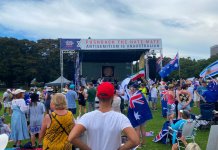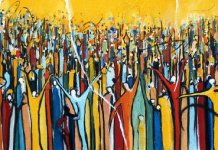Church leaders in the Philippines have condemned an anti-terrorism law that came into effect on 18 July 2020, saying the emergency powers granted to the state violated the civil liberties of the country’s citizens.
The Anti-Terrorism Act of 2020, was signed by President Rodrigo Duterte (pictured) on 3 July 2020, after its adoption by both Houses of Congress. The law set broad limits on the definition of terrorism and created an Anti-Terrorism Council which would define who was a terrorist.
Those detained under the Act could be held up to 24 days without judicial warrant and eliminated existing laws that compensated individuals wrongfully accused and detained by the police or military.
A pastoral letter from the Philippine Catholic bishops was read in churches across the country on 19 July 2020 criticizing the new law.
The President of the Bishops Conference, the Bishop of Caloocan Pablo Virgilio David, wrote the new laws created a “model of intimidation” which created a “detrimental climate to freedom of expression”.
Bishop David deplored the way in which “political pressure from above” prompted Congress to adopt the law over the objections of the “voices below”.
“They did not seem to care about the dissent of many of the people they represent: associations of lawyers, academics, economic sectors, trade unions, youth organizations, NGOs, political movements, religious communities” and local governments.
The Council of Bishops of the Episcopal Church of the Philippines on 5 June 2020 released a pastoral letter voicing their displeasure with the law also. “At a time when the country is reeling from the effects of the COVID-19 pandemic and when the call for everybody to work together to address this health crisis is paramount, we believe that this legislative measure should take a back seat and go through a more thorough deliberation at a more appropriate atmosphere or be debunked altogether.”
While supporting the government’s aim to preserve life and property from terrorist acts, this law did not do the job. The Episcopal Church was “concerned” the new law would “constrict our democratic space and inhibit in any way the exercise of our constitutional rights. We believe that a vibrant democracy allows for dissent, criticism or opposition of proposed or actual public policies, programs and actions so that as a nation we will all find the best way to move forward in ensuring the peace, justice and prosperity of our people.”
The law also set back the independence of Congress and the judiciary against the power of the presidency. Rather than weaken the checks and balances among the instruments of government “We should instead be finding ways to strengthen such systems.”
The bishops’ letter is appended below:
“What father among you, if his son asks for a fish will instead of a fish give him a serpent; or if he asks for an egg, will give him a scorpion?” (Luke 11.11-12 RSV)
The Council of Bishops of the Episcopal Church in the Philippines expresses grave concern over the proposed Anti-Terrorism Act of 2020 which is now approved by both Houses of Congress. At a time when the country is reeling from the effects of the COVID-19 pandemic and when the call for everybody to work together to address this health crisis is paramount, we believe that this legislative measure should take a back seat and go through a more thorough deliberation at a more appropriate atmosphere or be debunked altogether.
We support legislative measures to strengthen the prevention of any effort to cause loss of lives, bodily injury or destruction of property for political, ideological or religious purposes. But, we are very much concerned with the use of such measures to constrict our democratic space and inhibit in any way the exercise of our constitutional rights. We believe that a vibrant democracy allows for dissent, criticism or opposition of proposed or actual public policies, programs and actions so that as a nation we will all find the best way to move forward in ensuring the peace, justice and prosperity of our people. We re-iterate the apostolate of the church as peacemaker and peacekeeper, upon which this call rests.
We are especially concerned with the weakening of systems of checks and balances desirable in any legislative measure to prevent abuse especially since in our long struggle to craft a better democratic society, these systems have often been challenged by mere suspicions and tagging of personalities, organizations and institutions. We should instead be finding ways to strengthen such systems.
As we express this concern, we pray that the Holy Spirit which descended upon us on Pentecost guide our legislators and government officials as they work to address the overwhelming challenges we face at this time.
05 June 2020
Quezon City, Philippines
THE MOST REV. JOEL A. PACHAO Prime Bishop & Chair, Council of Bishops
THE RT. REV. REX R.B. REYES, JR. Bishop of Central Philippines & Secretary of the Council of Bishops










